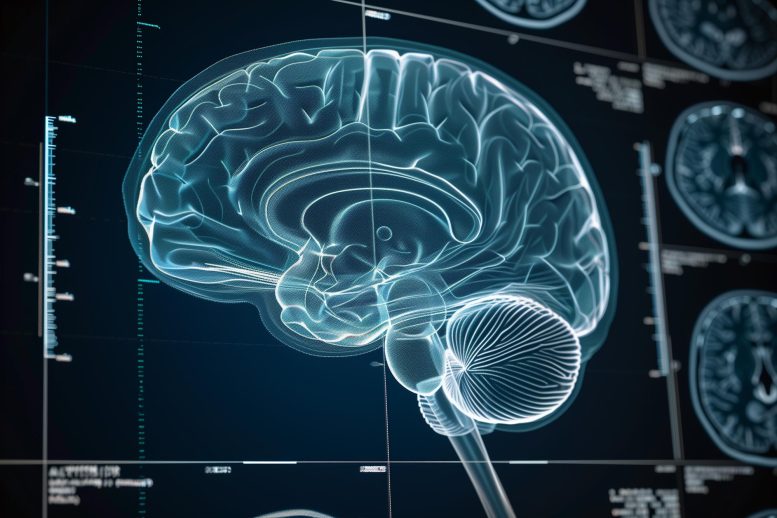AI Achieves Remarkable 82% Accuracy in Forecasting Alzheimer's Progression

Cambridge researchers have developed an AI tool that accurately predicts Alzheimer’s progression in individuals with early dementia signs, using non-invasive and cost-effective methods. This innovation could significantly reduce reliance on costly diagnostic procedures and improve early intervention strategies, potentially benefiting millions globally. Credit: SciTechDaily.com
An AI model from Cambridge University can predict Alzheimer’s progression with 82% accuracy using simple cognitive tests and MRI scans, offering a non-invasive and cheaper alternative to traditional diagnostics.
Cambridge scientists have developed an artificially intelligent tool capable of predicting in four cases out of five whether people with early signs of dementia will remain stable or develop Alzheimer’s disease.
The team says this new approach could reduce the need for invasive and costly diagnostic tests while improving treatment outcomes early when interventions such as lifestyle changes or new medicines may have a chance to work best.
Dementia poses a significant global healthcare challenge, affecting over 55 million people worldwide at an estimated annual cost of $820 billion. The number of cases is expected to almost treble over the next 50 years.
The main cause of dementia is Alzheimer’s disease, which accounts for 60-80% of cases. Early detection is crucial as this is when treatments are likely to be most effective, yet early dementia diagnosis and prognosis may not be accurate without the use of invasive or expensive tests such as positron emission tomography (PET) scans or lumbar puncture, which are not available in all memory clinics. As a result, up to a third of patients may be misdiagnosed and others diagnosed too late for treatment to be effective.
A team led by scientists from the Department of Psychology at the University of Cambridge has developed a machine learning model able to predict whether and how fast an individual with mild memory and thinking problems will progress to developing Alzheimer’s disease. In research published today (July 12) in the journal eClinical Medicine, they show that it is more accurate than current clinical diagnostic tools.
To build their model, the researchers used routinely collected, non-invasive, and low-cost patient data – cognitive tests and structural MRI scans showing grey matter atrophy – from over 400 individuals who were part of a research cohort in the USA.
They then tested the model using real-world patient data from a further 600 participants from the US cohort and – importantly – longitudinal data from 900 people from memory clinics in the UK and Singapore.
The algorithm was able to distinguish between people with stable mild cognitive impairment and those who progressed to Alzheimer’s disease within a three-year period. It was able to correctly identify individuals who went on to develop Alzheimer’s in 82% of cases and correctly identify those who didn’t in 81% of cases from cognitive tests and an MRI scan alone.
The algorithm was around three times more accurate at predicting the progression to Alzheimer’s than the current standard of care; that is, standard clinical markers (such as grey matter atrophy or cognitive scores) or clinical diagnosis. This shows that the model could significantly reduce misdiagnosis.
The model also allowed the researchers to stratify people with Alzheimer’s disease using data from each person’s first visit at the memory clinic into three groups: those whose symptoms would remain stable (around 50% of participants), those who would progress to Alzheimer’s slowly (around 35%) and those who would progress more rapidly (the remaining 15%). These predictions were validated when looking at follow-up data over 6 years. This is important as it could help identify those people at an early enough stage that they may benefit from new treatments, while also identifying those people who need close monitoring as their condition is likely to deteriorate rapidly.
Importantly, those 50% of people who have symptoms such as memory loss but remain stable, would be better directed to a different clinical pathway as their symptoms may be due to other causes rather than dementia, such as anxiety or depression.
Senior author Professor Zoe Kourtzi from the Department of Psychology at the University of Cambridge said: “We’ve created a tool which, despite using only data from cognitive tests and MRI scans, is much more sensitive than current approaches at predicting whether someone will progress from mild symptoms to Alzheimer’s – and if so, whether this progress will be fast or slow."




